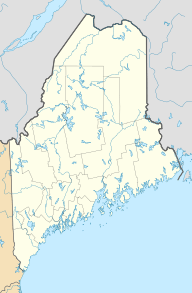Rainbow Lake (Maine) facts for kids
Quick facts for kids Rainbow Lake |
|
|---|---|
| Location | Piscataquis County, Maine |
| Coordinates | 45°49′N 69°07′W / 45.817°N 69.117°W |
| Lake type | oligotrophic |
| Primary outflows | Rainbow Stream |
| Basin countries | United States |
| Max. length | 4 mi (6.4 km) |
| Max. width | 1 km (1,100 yd) |
| Surface area | 1,626 acres (658 ha) |
| Max. depth | 130 feet (40 m) |
| Water volume | 63,348 acre⋅ft (78,139,000 m3) |
| Surface elevation | 1,050 ft (320 m) |
Rainbow Lake is a beautiful lake located in the North Maine Woods in Piscataquis County, Maine. It is known for its very clear water. This lake is important because it is the starting point for Rainbow Stream.
About Rainbow Lake
Rainbow Lake is a special type of lake called oligotrophic. This means it has very few nutrients in its water. Because of this, the water is unusually clear and clean. The lake is surrounded by large granite boulders, which also helps keep the water pure.
Where the Water Goes
The water from Rainbow Lake flows out through Rainbow Stream. This stream starts at a dam on the west side of the lake. Rainbow Stream then travels about 4 miles (6.4 km) south. It empties into Nahmakanta Lake.
From Nahmakanta Lake, the water continues its journey. It flows through Nahmakanta Stream and then into the Pemadumcook Chain of Lakes. Finally, all this water eventually reaches the large Penobscot River.
Exploring the Area
The famous Appalachian Trail passes by Rainbow Lake. Hikers on this trail can follow Rainbow Stream and walk along the south shore of the lake. It's a great spot for nature lovers.
There used to be an old logging road that led to the dam. However, this road is now very difficult to use. It has become boggy and wet in many places. This means it is no longer easy to drive on, even with special four-wheel drive vehicles.
What Lives in the Lake?
Rainbow Lake is home to a native population of brook trout. These fish are a type of salmonid and are well-suited to the lake's cold, clear, and nutrient-poor waters. They are an important part of the lake's ecosystem.
 | Roy Wilkins |
 | John Lewis |
 | Linda Carol Brown |



